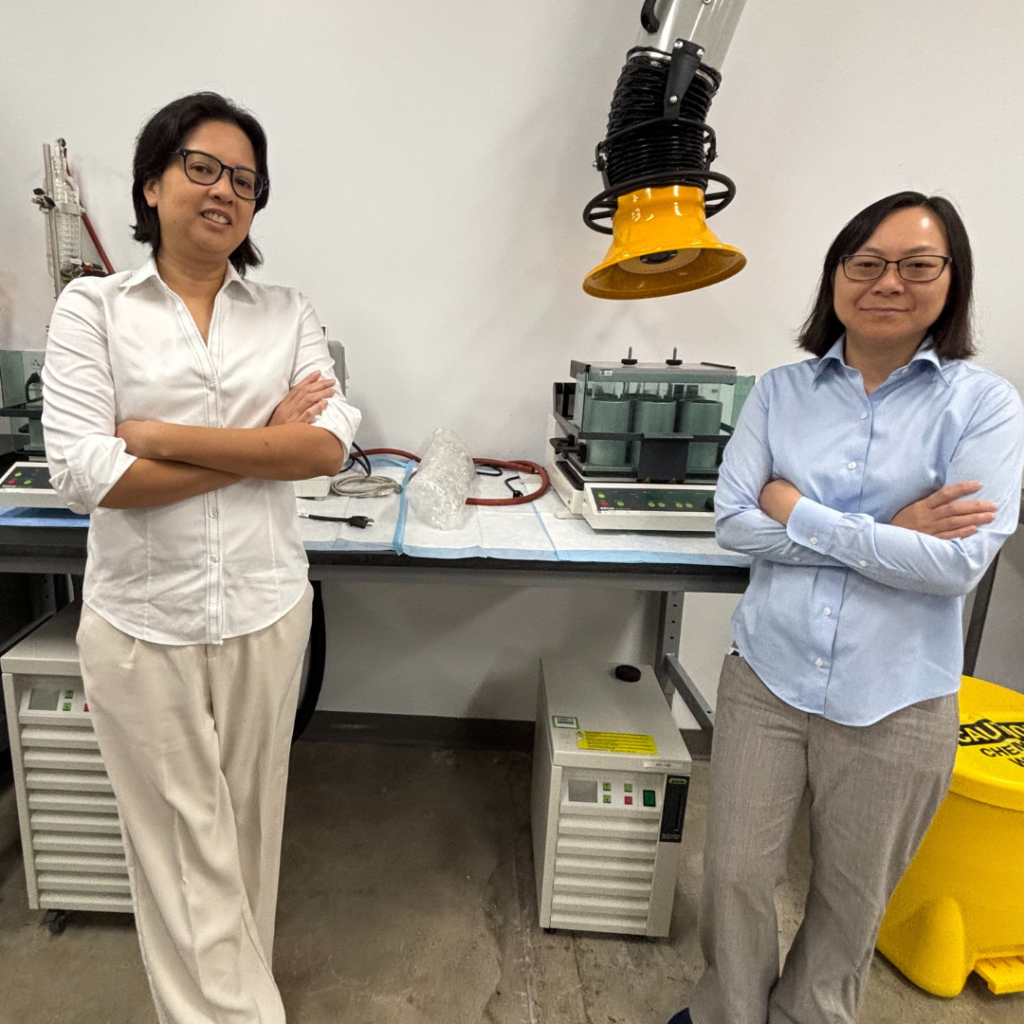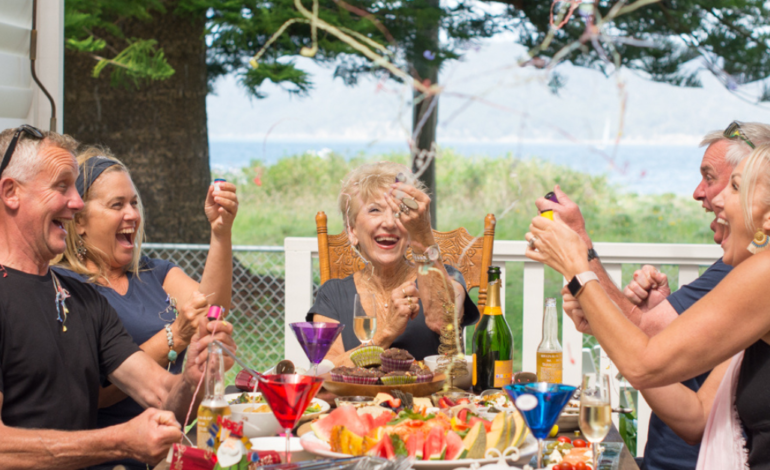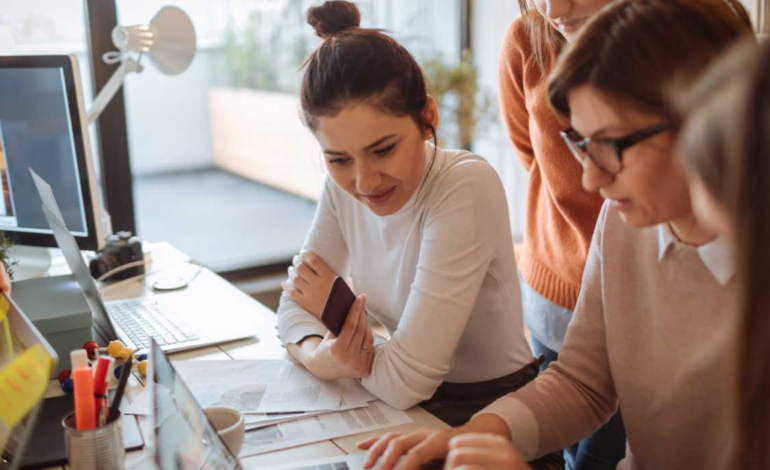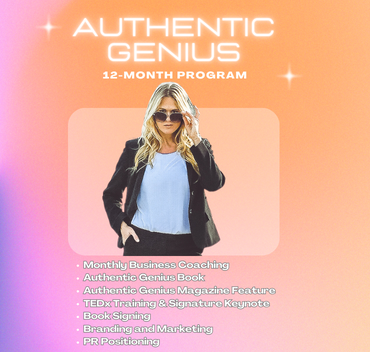By Tia Cristy
Meet MyPhuong Le and Leah Villegas – Our 2024 She Talks Innovators of the Year

Biologists, MyPhuong Le and Leah Villegas, were both immigrants, MyPhuong from Vietnam and Leah from the Philippians. They were united by science and became fast friends before collaborating on their innovation skills to make a positive impact on this world. They enjoyed the Grad life at the University of Florida in Gainesville, where they first met when MyPhuong was doing a rotation in Leah’s lab. They shared common ground in their immigrant childhoods, their love for the sciences, and their audacious dreams with one another. And after that, they went out into the world in two different geological directions… But before we get too far down the road on the journey of how these two friends became the innovation experts they are today, let’s first look at what they are leading today so you can understand why they have been named Lead and Empower Her She Talks Innovation Leaders of 2024.
Today at Aquillius
Aquillius, derived from the Latin word aquila, meaning “eagle”, based in San Diego, California, is a venture capital firm and biotech incubator focused on addressing critical needs in human health, sustainability, and biotech innovation. With MyPhuong Le and Leah Villegas remaining at the helm as President and Vice President, Aquillius aims to support companies tackling climate change, healthcare innovation, and equity challenges in technology and executive representation. Through initiatives across capital investment, mentorship, and entrepreneurship training, Aquillius combines scientific expertise with sustainable investment practices, working as what MyPhuong describes as an “activist investor”—an investor interested not only in returns but also in fostering social and environmental impact.
One of Aquillius’s foundational missions is to increase diverse representation within the biotech industry, which has been predominantly led by male counterparts.
“It’s time for women,” says MyPhuong. “And I think this is why She Talks is so important, right?”
This lack of diversity can hinder the types of problems addressed and the perspectives brought into product development, particularly in a field as impactful as healthcare and environmental technology. Aquillius addresses this disparity through its own leadership structure and its commitment to providing capital and mentorship to startups founded by diverse and underrepresented individuals. By positioning itself as an ally to innovators from various backgrounds, Aquillius hopes to set a new standard for inclusivity and social responsibility in venture capital.

Leah, the Managing Partner at Aquillius, plays a critical role in the firm’s incubation and mentorship programs, leveraging her background in science and sustainability to guide startups in developing eco-conscious products and sustainable business strategies.
“You know… I come from a long line of pharmacists, so they (the family) were encouraging me to do that,” says Leah as she tells me about her educational path. “But then I discovered the pharmaceutical sciences and that interested me more… that was the start of my graduate journey that brought me here today.”
Together, MyPhuong and Leah oversee Aquillius Ventures, the investment arm of Aquillius, which provides early-stage funding to startups that align with the firm’s focus on health and environmental sustainability. Unlike many traditional venture capital firms, Aquillius emphasizes a dual bottom line—profit and purpose—seeking out companies that not only promise returns but also demonstrate the potential to make meaningful contributions to global health and environmental goals.
After Graduation
Leah, who graduated first, went on to the Mao clinic in Minnesota. After MyPhuong graduated, she ended up at the University of Denver.
“We were both working on our independent studies at the time,” says Leah.
“But then, Leah left Minnesota to come to Denver,” MyPhuong adds.
“Yes,” says Leah. “We wrote grants together, funded grants together, and then that became the start of many of our scientific collaborations.”
In 2010, things took a drastic turn for MyPhuong and her health. She shared that she had found a concerning lump in her breast. At the young age of 34, she followed all the practical protocols for this kind of situation. The mammogram was first and inconclusive. Next, the ultrasound. Again, inconclusive. Then, the biopsy. Inconclusive, once again. Finally, they did a lumpectomy.
“I was young, but my doc said she practiced CYA medicine. So, I asked, ‘What’s CYA?’ and she (the doctor) said, ‘Cover Your Ass’, so, I agreed with whatever she wanted to do,” MyPhuong chuckles.
Unfortunately, the call came in with a definite answer this time.
“She said, ‘You have breast cancer’ right over the phone,” MyPhuong says.
After many rounds of doctors, diagnoses, and surgeries, she had a double surgery and because it was caught so early, she did not need chemoradiation.

“It was probably around then I realized, I didn’t have to make everything,” she says. “I needed to do something to encourage technology, …Could my role in life be to break down those barriers, to make these founders successful, so they can get their technology out there?”
I am happy to report that MyPhuong is cancer-free today and absolutely living her vision. And, I guess it’s safe to say that it all started when these two ladies went to a seminar, grabbed a pamphlet, and then, had a conversation with a sibling. You never know when that big idea will hit and catapult you where you are meant to go.
Mirco Moves Turn into Big Moves
In 2015, they co-founded and established a company called MircoTek, with MyPhuong’s brother, Tri (pronounced- Tree) Le.
Okay, so a bit more detail on the story… MyPhuong tells me, she and Leah went to a conference in San Diego and heard about the idea of a swallowable device that can deploy drugs into specific parts of the system. She was so excited about the idea, and she shared this genius concept with her brother.
“And he said, ‘I can make that for you,’ and I was like what?” says MyPhuong full of surprise.
It turns out, Tri makes macrobiotics.
“So, we all looked at each other, …and I said, ‘So how serious are we about this?’ and that was the start of our biotech company.
Today, Tri is the active President of MicroTek.
Bringing tech to life is the passion of MyPhuong and Leah. When I asked about any new projects that they would like to share, MyPhuong joyfully mentioned the current development of a respiratory sensor.
The respiratory sensor will be able to monitor the lung capacity and function to help diagnose lung diseases, and at some point, be connected to ventilation systems, so there will be less damage to patients from ventilators going forward. The hope for the sensor is that it will also be able to monitor premature babies and help in the successful development of the baby’s lungs while in the NICU.
“It’s (Their mission on the sensor) for the children mostly,” MyPhuong says. “There is nothing currently out there for them.”
2019, And Onto the Aquillius Mission
It was in 2019 when MyPhuong and Leah decided it was time to move to San Diego. They left Denver and arrived just in time for COVID-19 to hit. They were shut down for one day, but because they were an ISO 13485, with PPEs and clean rooms, they were extremely lucky to reopen the very next day.
“We don’t know what it’s like to work from home,” says MyPhuong, “Because we were always working… Luckily, we all survived. We all went through this together, and we ended up growing during Covid.”

Covid forced them to become more like a manufacturing company. However, the scientists, MyPhuong and Leah, became complacent not having the regular abilities to deep-dive into their research. Instead, they were stuck running HR and paperwork. They learned a crash course in what it takes to run a business. They wanted more. Upon their search, the idea was to start their own business to help startups and become the incubator to help others in other operations. Aquillius was born. With the blessing of Tri, Aquillius successfully spun off MicroTek to create a greater community space.
“I think as a founder, everyone kind of has that feeling that they’re alone,” says MyPhuong, “When we started Aquillius, we wanted everyone to come together, …A collaborative ecosystem.”
Aquillius achieves its mission through multiple programs designed to meet the unique needs of startups at different stages of development. For instance, the Catalyst Entrepreneurship Program is a ten-week accelerator that equips first-time founders and budding entrepreneurs with essential business skills and knowledge needed to move from ideation to marketable prototypes. By providing a structured, supportive environment, Catalyst enables participants to learn not only the fundamentals of entrepreneurship but also the specifics of navigating the complex biotech landscape.
Complementing Catalyst, the Spark Apprenticeship is a one-to-two-year program that offers students from underserved backgrounds hands-on training in biotech and tech industries. Spark seeks to bridge the skills gap by providing early-career professionals with exposure to cutting-edge technologies and hands-on experience that they might not otherwise receive through traditional educational pathways. This program aligns with Aquillius’s mission to increase representation in biotech and empower a more diverse generation of leaders.
“It all came together as how we envisioned it,” says MyPhuong.
“A lot of people have become reliant on us and these resources,” says Leah, “We are at the point of no return… We can’t stop now because we have so many people relying on these resources.”
The Eagle is Soaring
Beyond its programs, Aquillius fosters a collaborative community where innovative ideas can thrive. The firm frequently hosts symposiums and pitch events that allow startups to present their projects to industry experts, potential investors, and other stakeholders. These events not only offer startups invaluable feedback and insights but also create opportunities for strategic partnerships and networking. For many participants, these symposiums are pivotal moments for securing the resources and mentorship they need to scale their ventures. This emphasis on community-building and collaboration is central to Aquillius’s philosophy, as MyPhuong and Leah believe that tackling complex global challenges requires diverse ideas and cooperation across industries.
Aquillius’s activist investor approach is particularly focused on addressing the climate crisis. According to Le, much of the difficulty in solving environmental issues lies not in a lack of innovative ideas but in the insufficient funding and support for such innovations to scale rapidly. MyPhuong and Leah advocate for a model in which investors, particularly those in the sustainability sector, are not just passive financiers but active participants in driving change. This philosophy is embedded in Aquillius’s work with early-stage startups that prioritize sustainability. By supporting companies that tackle climate issues, from carbon reduction technologies to green infrastructure, Aquillius aims to play a part in accelerating the development of impactful solutions.
In addition to its commitment to funding and mentoring startups, Aquillius has developed advanced facilities and resources that startups can access through its incubator programs. These facilities include lab space, electronic manufacturing capabilities, 3D printing for biocompatible materials, and access to high-tech equipment like flow cytometers. By offering startups affordable access to these essential resources, Aquillius enables companies to prototype, test, and refine their products without the prohibitive costs that often accompany cutting-edge research and development. This infrastructure is essential to Aquillius’s strategy of reducing barriers for early-stage companies that might not have the capital to secure such resources independently.
“If we’re able to help one startup get that drug out that helps a million patients, if we can help that founder get that medical device out, …Or, that startup that has sustainable technology to help the environment that can affect millions, …And then, suddenly, we have this trickle effect…,” says MyPhuong.
Through these multifaceted initiatives, Aquillius aims to redefine the role of venture capital in society. Rather than focusing solely on financial gain, Aquillius emphasizes the importance of long-term impact, both in human health and environmental sustainability. The firm envisions a future where socially responsible investments are the norm rather than the exception, with venture capitalists actively contributing to global well-being. As MyPhuong and Leah continue to expand Aquillius’s reach and influence, they hope to inspire other venture capital firms to adopt similar principles and prioritize investments that align with both profitability and societal good.
In Sum
Aquillius is a unique force in the venture capital world, blending rigorous scientific focus with a mission-driven approach that seeks to improve health and environmental outcomes. By nurturing a new generation of diverse leaders and fostering a collaborative ecosystem, Aquillius is setting a precedent for how venture capital can be a powerful agent of positive change. Whether through its dedicated accelerator and apprenticeship programs, its advocacy for sustainable investment practices, or its commitment to diversity and inclusion, Aquillius is actively shaping the future of biotech and sustainability for the better.
“Leah would say, entrepreneurship is hard, but people do it because they have passion for it. Keep at it, right?” MyPhuong looks to Leah and Leah agrees. “You don’t have to do it alone.”
Congratulations MyPhuong Le and Leah Villegas for being 2024’s Innovation Leader(s) of the Year! The difference you are making in this world is substantial and remarkable.





